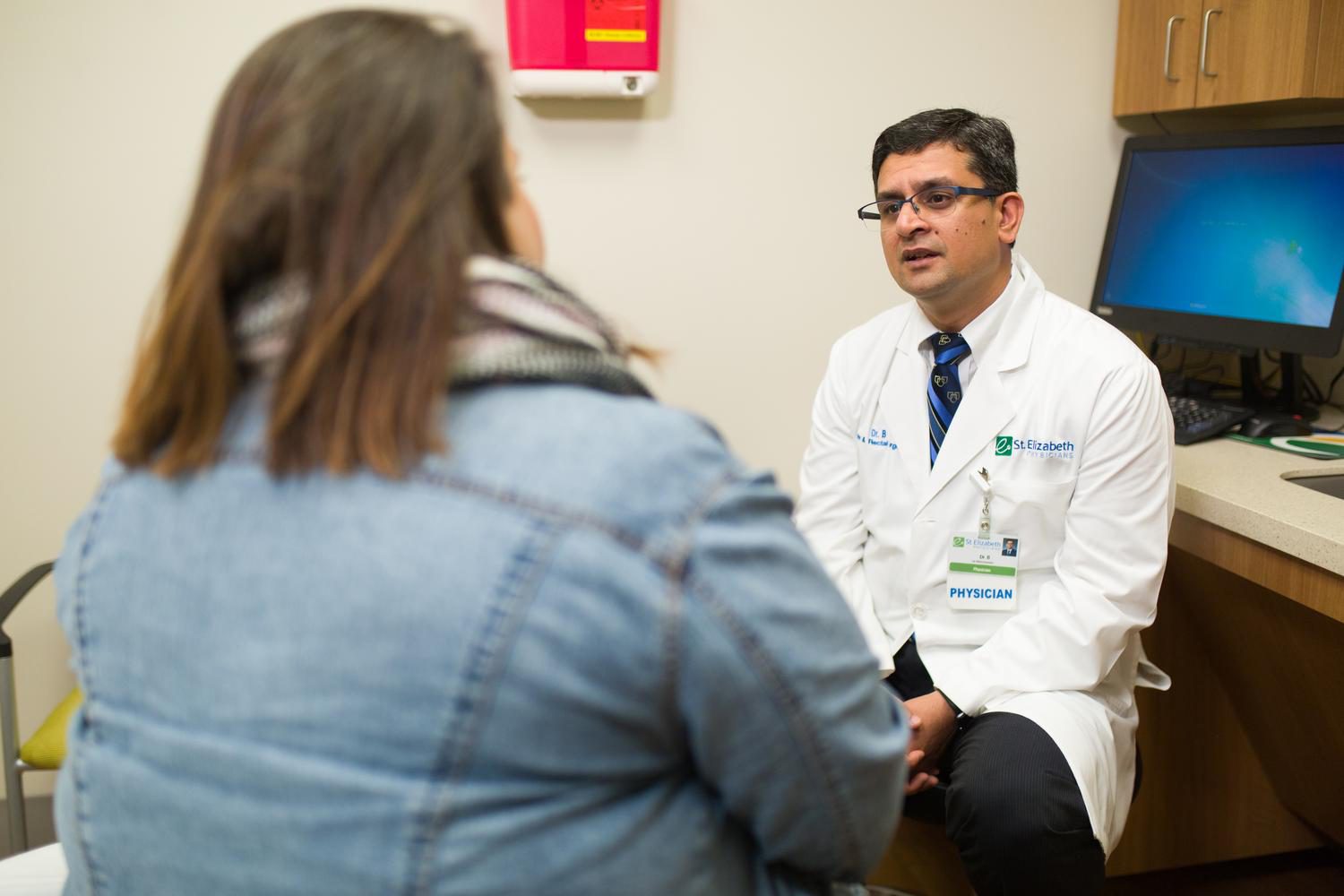Digestive or GI Cancer
St. Elizabeth Healthcare takes a team approach to screening, diagnosing and treating digestive and gastrointestinal cancer. No two people and no two cancers are identical. Our experts work together to treat your unique condition.
What You Should Know About Digestive Cancer
Digestive and gastrointestinal cancers are cancers that affect your digestive system, liver, gallbladder or bile ducts. It’s the most common form of cancer in the United States for both men and women. It tends to occur most often in people over 60.
Types of digestive cancer include:
Symptoms of GI cancers vary depending on its location and severity. Warning signs include:
- Abdominal pain.
- Blood in the stool.
- Constipation.
- Diarrhea.
- Fatigue.
- Feeling bloated.
- Heartburn.
- Jaundice (yellowing of the skin and whites of the eyes).
- Loss of appetite.
- Nausea.
- Problems swallowing.
- Unexplained weight loss.
- Vomiting.

Make an appointment
For more information, please contact your oncologist or the Cancer Care Center at (859) 301-4000.
Preventing Digestive Cancer
Making positive lifestyle choices and visiting your doctor regularly can lower your risk for digestive cancer. Lifestyle changes that can help reduce your risk include:
Common Risk Factors of Digestive Cancers
Digestive cancers can be caused by a number of different factors, but they share some common risk factors, including:
- Environmental exposures.
- Family history of digestive cancer.
- Infection with helicobacter pylori, bacteria that can cause stomach ulcers.
- Pernicious anemia.
- Stomach or intestinal polyps.
Digestive Cancer Screening
Your physician may recommend screening with a simple blood test if you are at high risk for liver, pancreatic or endocrine cancer.
There are a number of screening tests for colon and rectal cancer, including a colonoscopy. A colonoscopy is considered the most effective at finding colorectal cancer early. Regular colonoscopy exams should begin at age 50 or earlier if you have a family history of colon cancer. Your doctor will recommend a follow-up screening schedule based on your first colonoscopy results and your risk factors.
Genetic Testing for Digestive Cancer
We know that a cancer diagnosis comes with many questions — including whether a family member is at risk for getting cancer too or whether your cancer diagnosis is hereditary. The certified genetic counselors at St. Elizabeth Healthcare are here to help you uncover those answers.
If you have a family history of cancer or are concerned about your risk for digestive cancer, genetic counseling is an option to consider. Genetic counseling provides important information to you and your family about cancer risk and risk reduction and prevention.
For patients diagnosed with digestive cancer, our hereditary cancer program offers information and resources on inherited disease. Our team recommends that patients diagnosed with this cancer undergo a genetic evaluation to determine genetic risk. Genetic testing can help determine how a cancer will respond to treatment — and allow us to develop a laser-focused treatment plan specific to your cancer cells’ anatomy.
Digestive Cancer Diagnosis
If your doctor suspects that you have digestive cancer, we may run tests to determine the type of cancer and develop the best treatment plan. These tests may include:
At St. Elizabeth Healthcare, we have an MRI test specifically for pelvis and rectal cancer. Our radiology team also has specialists dedicated to diagnosing rectal and pelvic cancer.
Digestive Cancer Treatments
At St. Elizabeth Healthcare, we believe in caring for you, not just treating your cancer. Our holistic approach means we combine cancer treatment to minimize side effects and help you manage them. Our goal is to make you as comfortable as possible while using innovative approaches to treat your cancer.
We have a team of doctors that reviews every digestive cancer diagnosis. The team includes medical oncologists specializing in immunotherapy and precision medicine, surgical oncologists, radiation oncologists, interventional radiologists, thoracic surgeons, pain management specialists, genetic counselors, pathologists, nutritionists, pharmacists, nurses and support staff members. They work together to create a treatment plan that’s just right for you.
Your treatment plan may include:
Digestive Cancer Surveillance
When you are diagnosed with digestive cancer and have completed treatment, we monitor your condition to make sure you remain healthy. Our goal is to eliminate any possible recurrence as early as possible. After your cancer is treated, we will continue to see you every three months until we feel yearly monitoring would be safe.
Routine screening is a proven method to detect cancer early. Our comprehensive surveillance schedule meets your unique medical needs and can include:
- Follow-up visits
- Occupational therapy
- Physical therapy
- Routine testing
- Specialist appointments
- Support group recommendations
Certified oncology data specialists maintain and update our Cancer Registry. St. Elizabeth keeps a record of all the cancer cases we’ve diagnosed or treated since 2000. We use this database to gather vital information, stay on top of trends, measure the effectiveness of different treatments, and gauge cancer’s impact on our community.


